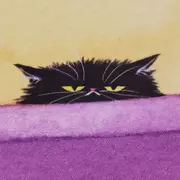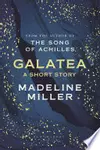
altlovesbooks's Books by Status
391 Books
See allaltlovesbooks's Reading Goals
altlovesbooks's Pinned Lists
altlovesbooks's Most Popular Reviews
I fully admit I read this to keep up with my Goodreads goal for the year. It's also been on my to-read list ever since I finished Circe and Song of Achilles, so it wasn't entirely picked for ulterior reasons. I'm actually glad I gave this a chance, it was very short but also very engaging.
It takes the name from a Nereid from mythology, but as far as I can tell, the rest of the story has nothing to do with the actual (fairly sparse) story. It's actually more like a perspective-flipped Pygmalion, which is acknowledged by the author in the afterword and in other reviews here.
It was actually kind of a super creepy story that I expected to go a different way. I kept reading (for the half hour or so I spent with it) to find out where things were headed, and didn't even mind that it's a bit lacking in depth.
So, not only did it keep me and my arbitrary Goodreads goal afloat another week, I actually really enjoyed it. Definitely read either Circe or Song of Achilles first if you haven't yet, but this is a nice little bite-sized story after you're done with those.
Contains spoilers
What, and I say this with all the intensity and fervor I can, the fuck.
If it wasn't so late in the year, if I weren't just barely keeping up with my Goodreads goal, this would've been a DNF almost immediately. Instead I said fuck it, let's see where this goes.
A weird body horror sex cult/human testing facility posing as a holistic makeup brand owned by a pedophile and managed by a woman nursing a monkey and who replaces her eyes with diamonds, is where it went.
The sacrifices I make for my Goodreads goal.
“As far as I was concerned, though, keeping my mouth shut was the most sensible approach to getting by in life.”
Keiko has always been different. Growing up she had problems understanding social norms, and her parents were concerned that she would always require an extra hand in life to get by. But soon after Keiko started going to university, she stumbled upon Smile Mart, a new convenience store opening up outside her train station. She was hired on, and spent the next 30-something odd years employed as a convenience store clerk. The same-ness of convenience store life appealed to Keiko, where there was an understandable pattern and flow to a workday. But everyone around her, from her parents to her friends to even her coworkers, felt that there was something wrong with her for not wanting something more for herself. Where was her permanent job? Her husband? Her kids? Troubled by this, Keiko decides to try and change these things about her to better conform with societal expectations... but things don't go as planned.
I really enjoyed the premise of this book! The thoughts and ideas the author puts forth about conformity and fitting in and “fixing” oneself were appealing to me, as was the description of Keiko's convenience store. Everything is the same, day after day, but not really when the product is constantly moving off the shelf and there's newness everywhere each day. This would have been a favorite of mine, if only...IF ONLY...Shiraha didn't exist. I know why he was needed in the story, but he was grating, he was dismissive, and his attitude really stunk. As soon as he was introduced and I saw where the author was going, I started losing steam in this book. Surely there were other ways of getting the same points across without having to read through his rantings about the Stone Age.
But this is a short book, and honestly the themes were really interesting to think about. As someone who is also in a part-time position voluntarily (but not for the same reasons), I identified with what Keiko was dealing with.
"This all has got to be, patently, the most unbelievable, the most ridiculous story I have ever heard."
Well, not my least favorite Murakami book to date (that'd be 1Q84). Started slow and puzzlingly, but managed to pull me in by the halfway point.
Our protagonist (from the first two Rat books) has a bit of a business problem. When designing a travel brochure, he unthinkingly uses the image his friend Rat sent him months previous of an idyllic hillside, mountain in the background, and sheep scattered on the grass. A mysterious man contacts him to demand he locate one of the sheep in the photo, a special sheep with a star on its back. What follows is a weird romp in rural Japan involving a sheep professor, a girl with unblocked, exquisite ears, and a guy in a skinsuit/sheep costume.
Yeah, typical Murakami, right?
I won't begin to summarize the themes of this book, because it's very literary and I'm pretty sure a large chunk went over my head. I enjoyed the fever dream of tracking down the sheep though, and thought this was a great follow on to the previous two books in this series. It really shows how far Murakami had come as a writer by the time he got to this book. It's very trippy, and really only for people who know what they're getting into with Murakami.
Contains spoilers
”Bean paste is all about feeling, young man.”
A weirdly calming read about an ex-convict’s dorayaki shop and the mysterious elderly Tokue he hires for basically peanuts. I say weirdly calming, because this book went places that I wasn’t expecting from the summary. I had some serious mood whiplash moments while reading this short, sweet, ultimately sad little novel.
Ex-convict Sentaro runs a dorayaki shop to pay off a debt. He’s making a rough go of it initially, because while he makes the pancakes from scratch, he buys pre-made sweet bean paste (name drop!) rather than make it from scratch. As a result his sweets are middling at best, and he doesn’t get much foot traffic as a result. Tokue, elderly woman with strangely twisted, ugly hands, starts hanging around his shop trying to get Sentaro to hire her. At first he refuses, but it’s only when she names some minuscule sum of money as her wage in exchange for making her sweet bean paste from scratch for him that he reluctantly hires her on. What follows is the two of them turning the shop around–until we start learning more about Tokue and her past.
I went into this blind, so when Tokue’s big reveal came, I was sort of floored. Leprosy was definitely not on my list of potential baggage. I was thinking more like dementia or homelessness or something. Regardless, this ended up being a pretty touching read for something so mood whiplash-y. I do sort of wish we find out how Sentaro ends up; I was rooting for him to open his own shop modeled after Tokue’s sweet bean paste, but the book ends before we get that far.
Still, a good, quick read. I sort of wish I had my own dorayaki to eat while reading this.

























